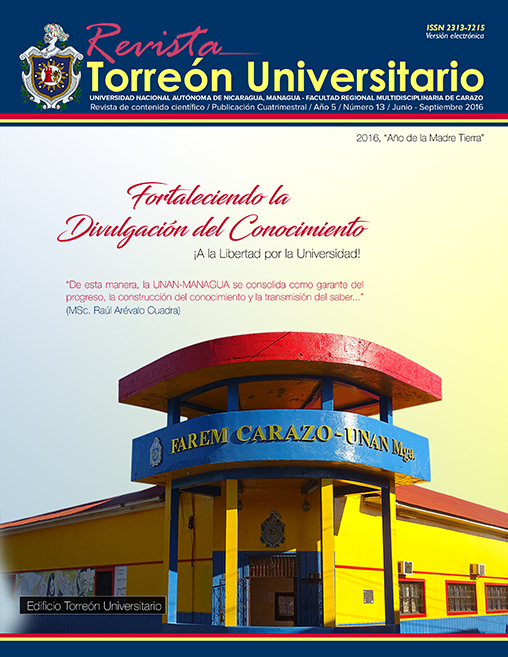Higher education and the Future challenges
Abstract
The University has been providing for centuries of traditional functions associated to progress, knowledge construction and transmission of knowledge, it has been set as one of the engines of economic development of society and one of the poles of education throughout life. Today the universities are in a process of transformation and radical changes as they represent a transcendent activity that requires a significant time investment of human and financial resources to adapt and be competitive in domestic and international markets, considering the globalized world in which higher education is.
Nowadays, university education has characteristics that define it as the educational process of higher education that takes place in an institution that acts in the search, acquisition and construction of scientific knowledge, as well as constant critic intellectual process knowledge. Traditionally, at the university, as in many other educational institutions, the teacher is the one who knows and the student who must assimilate this knowledge responsibly.
With the current global trend of competency-based approach, it becomes more complex and demanding process of educational planning in higher education and requires a specialist teacher training, enabling those learning tools and technical procedures to ensure that curricula possess a higher degree of validity and reliability in meeting the training needs.
Downloads
References
Aguerrondo, I. (2009). El nuevo paradigma de la educación para el siglo. Organización de Estados Iberoamericanos para la Educación la Ciencia y la Cultura (CEI) .
Aguerrondo, I. (29 de Julio de 2015). El aprendizaje bajo la lupa: Nuevas perspectivas para América Latina y el Caribe. Obtenido de: http:www.oei.es/index.php
Arrien, J. B. (2012). Las triadas de la Educación desde la persona, Breve ensayo para la reflexión. Instituto de Educacion de la Universidad Centroamericana (IDEUCA), 1.
Cordero, A. R. (2015). La educación ante el encuentro del cambio social: un atismo hacia el futuro. Juigalpa,Chontales: Colección Educativa.
Gallego, C. M. (2 de Marzo de 2012). www.vbeda.com/mContreras. Obtenido de www.vbeda.com/mContreras: httt://www.vbeda.com/mContreras
Galvez, R. J. (2015). Reflexiones y Perspectivas sobre la Educación en Nicaragua: Qué Educacion, Para qué Futuro. Juigalpa: Coleccion Educativa.
Lopez Noguero, F. (2007). Metodología Participativa en la Enseñanza Universitaria. En F. López Noguero, Metodología Participativa en la Enseñanza Universitaria (págs. 13-14). Madrid, España: Narcea s.a. de Ediciones.
Lopez, J. S. (1989). Fundamentos de la Educación. España: Edición: Ilustrada Impresa.
Maldonado, E. M. (2012). 18 Mitos de la Educación Superior: Retos de la Excelencia para las Universidades del siglo XXI (págs. 25,31). Managua, Nicaragua: Maxiño A. Estupiñan.
Noguero, L. F. (2007). Metodología Participativa en la Enseñanza Universitaria. Madrid, España: Narcea. s.a. de Ediciones.
Santos, F. (2008). Cómo aprender a estudiar y aprender con eficacia. México: Noriega.
Saturnino, D. L., Oliver, C. & Sevillano, M. L. (2010). Estrategias Didácticas en el Aula. Buscando la calidad y la Innovación. Madrid: Editorial Digital.
Downloads
Published
How to Cite
Issue
Section
License
The authors who publish in this journal agree to the following terms.
- The author or authors of the articles, essays or research grant the National Autonomous University of Nicaragua, Managua (UNAN-Managua) the editing rights (copyright) of the submitted work, therefore the University has the exclusive right to publish the article for the entire copyright period.
- These copyrights/authors authorize Torreón Universitario Magazine and the University to edit and disseminate/publish the article in said Magazine, including printed and electronic reproduction, storage, retrieval and any other type of publication, and sources of secondary information as services. of summaries and databases, they also empower it to protect the article against unauthorized use for dissemination by printed or electronic media (PDF, HTML, EPUB, XML or others).
License for use of content
The magazine uses the Creative Commons Attribution-NonCommercial-NoDerivs 4.0 International License.
Under this statement:

This journal is licensed under a Creative Commons Attribution-NonCommercial-NoDerivatives 4.0 International License. It can be copied, distributed and transmitted publicly as long as the author and source are cited (Revista Torreón Universitario), it should not be modified or used for any commercial purpose. The full license can be found at http://creativecommons.org/licenses/by-nc-nd/4.0/.



